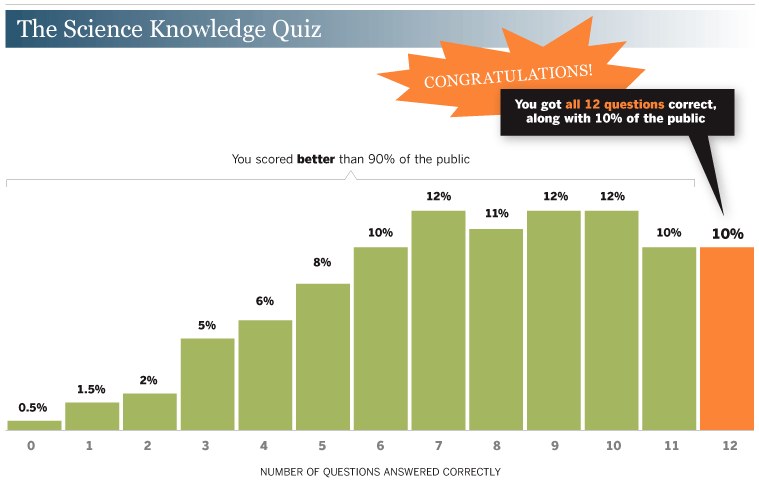 As we’re in a testing frame of mind, I thought I’d discuss a little quiz that was published as a kind of quasi-scientific assessment of intellect. The basic premise was to find out whether you, the participant, knows more science than the average American.
As we’re in a testing frame of mind, I thought I’d discuss a little quiz that was published as a kind of quasi-scientific assessment of intellect. The basic premise was to find out whether you, the participant, knows more science than the average American.
In The Science Knowledge Quiz you’re asked 12 questions, that most Sciencebase readers will perceive as relatively simple and straightforward, but the shock comes when you get your 12 out of 12 score and discover that you are in the top 10% and that 90% of previous respondents didn’t get them all right.
They’re multiple choice questions, which makes them even easier/harder, depending on your perspective, but I’m just going to list the questions without possible answers:
- Which over-the-counter drug do doctors recommend that people take to help prevent heart attacks?
- According to most astronomers, which of the following is no longer considered a planet?
- Which of the following may cause a tsunami?
- The global positioning system, or GPS, relies on which of these to work?
- What gas do most scientists believe causes temperatures in the atmosphere to rise?
- How are stem cells different from other cells?
- What have scientists recently discovered on Mars?
- The continents on which we live have been moving their location for millions of years and will continue to move in the future – true or false?
- Lasers work by focusing sound waves – true or false?
- Antibiotics will kill viruses as well as bacteria – true or false?
- Electrons are smaller than atoms – true or false?
- All radioactivity is man-made – true or false?
To be honest, many of these questions are not testing your scientific acumen at all, but your ability to retain “facts” several of which have been repeated in the media in recent years, such as the aspiring and Pluto questions (#1 and #2). The plate tectonics question also seems to be loaded as if they’re testing your belief in a static earth. Similarly question 5 about climate change gives us the “most” scientists notion that implies there are plenty who don’t believe that carbon dioxide causes global warming
That aside, I posted the original quiz on Twitter* with the provocative query: “Do you know more science than the average American?” and got a lot of responses from fellow Twitter users telling me that they too had got 12 out of 12 and were in the upper intellectual category. Many were relieved to be so. One respondent admitted to getting only 11/12…ouch. Another said the quiz was a simple ceiling to hit while another suggested that the questions were too easy…
But, that’s the point, these were relatively easy questions, wouldn’t you hope that most people would be able to answer all of them correctly without much effort? But, that was not the case, the vast majority of people who have taken the quiz got several wrong. A detailed analysis of the results of the survey can be found here.
In it, the researchers discuss the results of this quiz and several other surveys and come to the broad sweeping conclusions that the public praises science; scientists fault the public and the media and scientific achievements are less prominent than a decade ago.
Of course, those in the arts and humanities, could argue that the same kinds of results might emerge from a survey that asked questions about literature, poetry, history etc. It would be nice if everyone could receive an equitable and broad education that equipped them with a multitude of factoids and important information.
However, one point that always emerges when watching the likes of Mastermind and University Challenge is that the so-called scientific questions are almost always of the sort – what is the chemical symbolised by a K in the periodic table, or what type of substance neutralises an alkaline. In contrast, questions about Picasso or Orwell, for instance, invariably dig much deeper than that. It’s as if knowing about science comes with less kudos than knowing almost any other stuff. Knowing about aspidistras and how to keep them airborne is fascinating in its own right, but knowing about aspirin could mean a matter of life and death.
*That tweet was one of the most popular links I’ve ever tweeted with almost 1000 referrals back to the quiz page itself and dozens of retweets. It obviously touched a nerve…